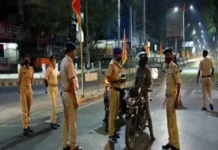The economic contraction and health crises have affected everything from education to jobs, presenting Chief Ministers such as Jagan with an unprecedented challenge.
On March 22 this year, a visibly exasperated Jagan Reddy, Chief Minister of Andhra Pradesh, held a media conference announcing a statewide lockdown in his state.
“It is not in my hands,” Jagan said, explaining that Andhra Pradesh too would impose a lockdown, like most states in the country. “We too have to suspend public transport, close schools, colleges and universities.”he said.
At the time, AP had only six COVID-19 cases, a number that would grow exponentially as the summer dragged on.
A month later, on April 27, Jagan appeared on television once more. AP’s Covid cases had risen to 1,177 with 31 deaths, but the Chief Minister appeared far more confident.
“We have to live with Corona,” Jagan said, but made clear that his government would continue to pursue his 2019 campaign agenda that won him and his YSR-Congress party a thumping majority over the Telugu Desam Party (TDP), led by veteran politician Nara Chandrababu Naidu.
The novel coronavirus pandemic has presented India’s state governments with a multi-pronged crisis: Prime Minister Narendra Modi’s ill-conceived and poorly executed national lockdown shrank India’s economy by nearly 24% last quarter, even as the pandemic rages on unchecked. On Sunday, India recorded more than 90,000 new cases in a single day – the highest numbers in the world. India now has the second largest number of Covid-19 cases in the world after the United States.
The economic contraction and the health crises have affected everything from schools and education to courts to jobs and recruitment to state finances, presenting Chief Ministers such as Jagan Reddy with an unprecedented administrative challenge.
The challenge for Jagan is particularly acute, given that he has never held a role in government before. Jagan has come to office at a time when AP is still coming to terms with the creation of the new state of Telangana in 2014.
Those close to Jagan say the first-time Chief Minister is determined to stick to a welfare-centric agenda premised on providing varying degrees of financial support to a wide swathe of Andhra’s residents—even as economists warn that the economic recession might make such policies harder to execute.
“When economists globally were unanimous in predicting the worst for the economy, manufacturing and industry, the Chief Minister decided to put money in people’s hands,” said Mekapati Gautam Reddy, Andhra Pradesh’s Industries Minister, and a close aide of the Chief Minister. “Once the festival season kicks in we will know how the money (which was distributed) comes back into the system”.
Analysts, in the meantime, worry that the Chief Minister is not sufficiently focused on finding ways to generate enough revenue to support his schemes.
“He should invest in building infrastructure and industry which will generate revenue,” said Mohan Guruswamy, chairman and founder, Centre for Policy Alternatives, who was earlier advisor to the former Finance Minister P. Chidambaram. “He should also invest in agriculture and in the IT and services sector in the state.”
“Instead of seeking to buy popularity the CM should reform the government mechanism and make administrative changes which set him apart from other Chief Ministers including his predecessor Chandra Babu Naidu,” Guruswamy said.
The opposition TDP has been more blunt in their assessment of Jagan’s first year as Chief Minister, and his emphasis on state-led spending.
“During Jagan Mohan Reddy’s 15-month rule he raised the state’s debt by Rs. 1 lakh crore. And the debt to GDP ratio of Andhra Pradesh is the highest in the country at 34.5%,” TDP spokesperson Pattabhi Ram Kommareddy told #KhabarLive. According to YSRCP leaders the previous Telugu Desam Party (TDP) government had incurred a debt of Rs. 2.6 lakh crore during its term.
Worse, said Kommareddy, the state had failed to attract fresh investments prior to the pandemic-induced recession.
“Two big companies—Lulu Group and Asia Pulp and Paper—pulled out of AP and the government has not attracted new investments in the last one year,” he alleged.
Long march to power
Most state governments in India follow broadly welfare-centric social policies. Yet, beyond this broad social consensus is a vast difference in the capacities of states to deliver on their promises.
Jagan is fortunate that AP has a relatively responsive and well-run state bureaucracy that, his supporters in government say, has allowed him to implement his campaign agenda in record time.
“We completed 90% of our election promises in the first year and a good chunk of this we achieved during the pandemic,” claimed Mekapati Gautham Reddy, his Industries minister.
The government, Mekapati Gautam said, has spent nearly Rs 50,000 crore between June 2019 and June 2020 on social welfare schemes listed in the nine point ‘Navaratnalu’ welfare agenda — which includes annual aid for farmers, mothers, students, and economically and socially deprived sections of society. G. Rohith of Human Rights Forum attested the Minister’s claim stating, “People have high expectations from him and it will be difficult to live up to those. But so far he has managed to implement his election promises and his mass appeal is high even now”.
The emphasis on social welfare, Andhra watchers say, comes from hard-learned experience.
“In 2014 he did not offer even a partial loan waiver for the farmers in his manifesto whereas his political rival TDP did,” said C. Ramachandraiah, a political analyst at Centre for Economics and Social Sciences (CESS)-Hyderabad. “That cost him dearly in the general election and he still seems to regret it.”
Andhra Pradesh’s electorate has long cycled between the TDP’s more market-focused approach and the welfarism of the Congress. In 2004, when TDP was in alliance with the Bharatiya Janata Party and the other National Democratic Alliance (NDA) partners in the Centre, exit polls had predicted a massive victory for Atal Bihari Vajpayee’s Shining India campaign.
At the time, Naidu had acquired a reputation as a digitally-savvy politician who had ushered in AP’s information technology boom.
Yet Y.S Rajasekahara Reddy — Jagan’s father — advocated a seemingly less popular “pro-farmer” campaign. YSR embarked on a series of marches on foot to highlight the plight of the farmers left out of the IT windfall.
The Congress swept to power that summer, winning 185 out of 234 Assembly seats in united Andhra Pradesh.
YSR’s position at the helm of Andhra politics was, however, short-lived. In September 2009, the 60-year-old Chief Minister died in a freak helicopter crash soon after winning a second term. Jagan soon fell out of favour with the Congress High Command. In 2011, Jagan split from INC to found the Yuvajana Sramika Rythu Congress Party (YSR-CP).
Yet his political future was bleak as he was arrested on a disproportionate assets charges filed by the Enforcement Directorate. He was released and contested the 2014 elections, but his electoral fortunes turned only in May 2019, after a long march in which he covered 3,648 kilometers by foot and resurrected public memory of his father YSR.
English focus
Those close to Jagan say the Chief Minister has urged his cabinet to respond to the coronavirus pandemic by continuing to focus on their core priorities.
In education, for instance, Education Minister Suresh Adimulapu said the state has focused on setting up English medium public schools to help students from historically marginalised communities. In November 2019, the government passed an order that made English medium instruction mandatory in all schools in the state.
The order was struck down by the High Court and its fate is now pending before the Supreme Court.
“There is no level playing field in the education sector where students hail from downtrodden communities and from rural backgrounds. In a way, depriving these students of English medium, well maintained schools amounts to educational untouchability,” said Andhra Pradesh minister Adimulapu Suresh, who is Dalit.
Adimulapu, who has a PhD in computer science, said the government had upgraded the infrastructure of close to 16,000 schools in the past year. Yet the effects of this upgrade are yet to be seen as schools haven’t reopened after the national lockdown in March.
Meanwhile, the state government claims it will distribute 1 million tablet computers to undergraduate and postgraduate students to facilitate online learning, said Satish Chandra, Special Officer to the government on Higher Education.
“This will benefit students of both private and public institutions who cannot afford gadgets on their own,” Chandra said.
Covid record
Jagan’s track record on tackling the coronavirus pandemic is hard to judge. The unprecedented scale and nature of the pandemic, and the poor quality of India’s data-gathering infrastructure, have made it hard to assess if any one state is doing better than the others.
States that do a good job of contact tracing, and follow-up testing, are likely to report more cases than those who are simply conducting fewer tests. Andhra Pradesh has been ahead in terms of testing, with tests per million population at 78,016 against India’s average of 35,726.
As of the first week of September 2020, the state had the second largest number of reported cases of Covid-19 with nearly half a million residents testing positive.
“The initial casual attitude of Jagan Mohan Reddy damaged the state and we are now the state with the second highest caseload in the country,” said Kommareddy, the spokesperson of the opposition TDP. Kommareddy also said Jagan’s government was yet to provide a public accounting for the Rs 8,000 crore of central relief disbursed to tackle the pandemic.
Yet, the state has recorded significantly fewer deaths than, say, Tamil Nadu, Karnataka or Delhi – all of which have reported similar numbers of cases.
Uttar Pradesh, for instance, has reported 266,000 cases with 3,920 deaths; AP has 4,417 deaths cases but almost twice the number of cases at 506,493. A total of 404,074 patients have recovered from the disease.
While Jagan’s critics will rightly point to the fact that the low death rate is a consequence of the state’s relatively robust public health system, which is a result of decades of investment by subsequent governments; his supporters have pointed to the creation of a vast army of over 400,000 village level workers recruited to help the government with last-mile implementation of its schemes.
The government says these workers — called volunteers despite drawing a monthly salary of Rs. 5,000 per month— have played a major role in cushioning the impact of the pandemic.
This summer for instance, as thousands of migrant workers stranded across the country began walking home, these “volunteers” helped arrange transport, quarantine and food and provisions.
Samuel Sagar, a 30 year old “volunteer”, recalled how the state government arranged buses to bring home workers stranded in Tamil Nadu and Karnataka. For the next fortnight, he kept track of the returned workers and their families with the aid of Andhra Pradesh’s robust network of Accredited Social Health Activist (ASHA) workers.
As the economic pain of the pandemic keeps rising, these “volunteer” jobs have become much-needed lifelines and have given a sense of purpose to those lucky enough to get them.
“Earlier I was an accountant in a private construction company and now I am in charge of 50 households in my village,” Sagar said.
To recruit volunteers like Sagar, as the country was heading towards a recession, AP government created 1.5 lakh jobs and issued notification at the village level. Here too, analysts worry that the government has few plans for when the bills for all this spending come due.
“Most of his welfare schemes incur revenue drain on a yearly basis. He has not been able to find steady revenue sources,” said Ramachandraiah, the political analyst from CESS.
Mekapati Gautam, the industries minister, disagreed.
“The Chief Minister is confident that the state’s economy will bounce back post-Covid”, he said. #KhabarLive #hydnews







